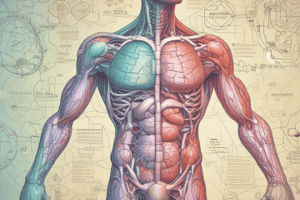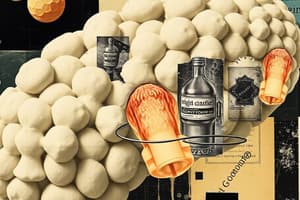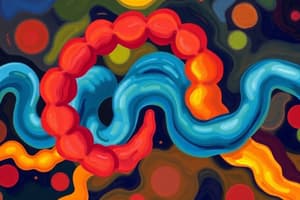Podcast
Questions and Answers
What are the three forms of energy storage in the body?
What are the three forms of energy storage in the body?
- Triglycerides, protein, glucose
- Glycogen, triglycerides, protein (correct)
- Glycogen, starch, protein
- Glycogen, triglycerides, minerals
Triglycerides are primarily stored in the liver.
Triglycerides are primarily stored in the liver.
False (B)
Where is glycogen stored in the body?
Where is glycogen stored in the body?
Liver and muscle
During the fasting phase, glucose is derived from the ______.
During the fasting phase, glucose is derived from the ______.
Match the hormones with their functions:
Match the hormones with their functions:
How long can triglycerides provide energy?
How long can triglycerides provide energy?
The use of protein for energy is efficient and cost-effective.
The use of protein for energy is efficient and cost-effective.
What hormone primarily controls anabolic processes for nutrient metabolism?
What hormone primarily controls anabolic processes for nutrient metabolism?
Glucose is stored as ______ and/or triglycerides during the digestive phase.
Glucose is stored as ______ and/or triglycerides during the digestive phase.
Match the hormones with their classification;
Match the hormones with their classification;
What effect does insulin have on skeletal muscle?
What effect does insulin have on skeletal muscle?
Insulin decreases ketogenesis in the liver.
Insulin decreases ketogenesis in the liver.
What is the main target of glucagon?
What is the main target of glucagon?
Insulin increases the activity of ________ in adipose tissue.
Insulin increases the activity of ________ in adipose tissue.
Match the hormone with its action:
Match the hormone with its action:
Which GLUT transporter is involved in glucose transport in the liver?
Which GLUT transporter is involved in glucose transport in the liver?
FFA can be directly converted to glucose.
FFA can be directly converted to glucose.
What happens during a marathon in terms of metabolic hormone activity?
What happens during a marathon in terms of metabolic hormone activity?
During a sprint, hormonal activity is too ________ for the body to respond effectively.
During a sprint, hormonal activity is too ________ for the body to respond effectively.
Match the activity with its phase:
Match the activity with its phase:
What role do alpha cells in the pancreas play?
What role do alpha cells in the pancreas play?
Carbo-loading guarantees improved performance.
Carbo-loading guarantees improved performance.
What causes the closure of ATP-dependent K+-channels in pancreatic beta cells?
What causes the closure of ATP-dependent K+-channels in pancreatic beta cells?
The initial burst of insulin secretion represents the release of ________ insulin.
The initial burst of insulin secretion represents the release of ________ insulin.
Match the pancreatic mechanisms with their functions:
Match the pancreatic mechanisms with their functions:
Which of the following hormones inhibits insulin secretion?
Which of the following hormones inhibits insulin secretion?
Insulin secretion is controlled solely by hormones.
Insulin secretion is controlled solely by hormones.
What is the main function of glucose entering pancreatic beta cells?
What is the main function of glucose entering pancreatic beta cells?
The ________ phase of insulin secretion involves the synthesis of new insulin.
The ________ phase of insulin secretion involves the synthesis of new insulin.
What is more efficient for insulin response, oral administration or intravenous?
What is more efficient for insulin response, oral administration or intravenous?
What is one function of epinephrine during physical activity?
What is one function of epinephrine during physical activity?
Growth hormone decreases blood glucose levels by increasing insulin sensitivity.
Growth hormone decreases blood glucose levels by increasing insulin sensitivity.
What role does cortisol play during stress or fasting?
What role does cortisol play during stress or fasting?
During exercise, plasma glucose remains steady because the liver releases __________ to match increased skeletal muscle uptake.
During exercise, plasma glucose remains steady because the liver releases __________ to match increased skeletal muscle uptake.
Match the hormone to its primary effect:
Match the hormone to its primary effect:
What happens to insulin levels during exercise?
What happens to insulin levels during exercise?
Fat oxidation can sustain high-intensity activities effectively.
Fat oxidation can sustain high-intensity activities effectively.
What does prolonged exposure to growth hormone stimulate in the kidneys?
What does prolonged exposure to growth hormone stimulate in the kidneys?
Cortisol has permissive effects with hormones like __________ and glucagon.
Cortisol has permissive effects with hormones like __________ and glucagon.
Which hormone is primarily responsible for regulating metabolism during stress?
Which hormone is primarily responsible for regulating metabolism during stress?
Flashcards
What are the three main forms of energy storage?
What are the three main forms of energy storage?
Glycogen, triglycerides, and protein are the three main energy storage forms in the body.
Where is glycogen stored and how long does it last?
Where is glycogen stored and how long does it last?
Glycogen is primarily stored in the liver and muscles, providing energy for a short duration, typically less than a day.
Where are triglycerides stored and how long can they provide energy?
Where are triglycerides stored and how long can they provide energy?
Triglycerides are stored in adipose tissue, representing the largest energy reservoir in the body, lasting several weeks.
Where is protein stored and why is using it for energy costly?
Where is protein stored and why is using it for energy costly?
Signup and view all the flashcards
What happens to glucose during the digestive phase?
What happens to glucose during the digestive phase?
Signup and view all the flashcards
How is glucose stored in the body during the digestive phase?
How is glucose stored in the body during the digestive phase?
Signup and view all the flashcards
What is the source of glucose, amino acids, and FFA during the fasting phase?
What is the source of glucose, amino acids, and FFA during the fasting phase?
Signup and view all the flashcards
Which hormone primarily controls anabolic processes for nutrient metabolism?
Which hormone primarily controls anabolic processes for nutrient metabolism?
Signup and view all the flashcards
Which hormones are counter-regulatory and promote catabolism?
Which hormones are counter-regulatory and promote catabolism?
Signup and view all the flashcards
Which hormone is the dominant regulator?
Which hormone is the dominant regulator?
Signup and view all the flashcards
Epinephrine's role in energy
Epinephrine's role in energy
Signup and view all the flashcards
Growth hormone's role in energy
Growth hormone's role in energy
Signup and view all the flashcards
Cortisol's role in energy
Cortisol's role in energy
Signup and view all the flashcards
Thyroid hormone's role in energy
Thyroid hormone's role in energy
Signup and view all the flashcards
Blood glucose during exercise
Blood glucose during exercise
Signup and view all the flashcards
Insulin's role during exercise
Insulin's role during exercise
Signup and view all the flashcards
Body's energy adaptation during exercise
Body's energy adaptation during exercise
Signup and view all the flashcards
Fat oxidation vs. glycogen for energy
Fat oxidation vs. glycogen for energy
Signup and view all the flashcards
Cortisol's effect on blood sugar
Cortisol's effect on blood sugar
Signup and view all the flashcards
Liver's role in maintaining blood glucose during exercise
Liver's role in maintaining blood glucose during exercise
Signup and view all the flashcards
Glucose Metabolism in Beta Cells
Glucose Metabolism in Beta Cells
Signup and view all the flashcards
GLUT2 Transporter
GLUT2 Transporter
Signup and view all the flashcards
ATP-sensitive Potassium Channels
ATP-sensitive Potassium Channels
Signup and view all the flashcards
Membrane Depolarization
Membrane Depolarization
Signup and view all the flashcards
Calcium Influx
Calcium Influx
Signup and view all the flashcards
Pancreatic Beta Cells
Pancreatic Beta Cells
Signup and view all the flashcards
Insulin
Insulin
Signup and view all the flashcards
Biphasic Insulin Secretion
Biphasic Insulin Secretion
Signup and view all the flashcards
Glucagon
Glucagon
Signup and view all the flashcards
Somatostatin
Somatostatin
Signup and view all the flashcards
Insulin Independent Glucose Transport in Muscle
Insulin Independent Glucose Transport in Muscle
Signup and view all the flashcards
Insulin Independent Glucose Transport in Liver
Insulin Independent Glucose Transport in Liver
Signup and view all the flashcards
Long-term Insulin Deficiency
Long-term Insulin Deficiency
Signup and view all the flashcards
Glucagon Action on Liver
Glucagon Action on Liver
Signup and view all the flashcards
FFA Indirect Effect on Glucose Synthesis
FFA Indirect Effect on Glucose Synthesis
Signup and view all the flashcards
FFA Glucose Sparing Effect
FFA Glucose Sparing Effect
Signup and view all the flashcards
Ketone Production
Ketone Production
Signup and view all the flashcards
GLP1 and Glucagon Interaction
GLP1 and Glucagon Interaction
Signup and view all the flashcards
Metabolic Activity During Sprint
Metabolic Activity During Sprint
Signup and view all the flashcards
Metabolic Activity After Marathon
Metabolic Activity After Marathon
Signup and view all the flashcards
Study Notes
Energy Storage Forms
- The three energy storage forms in the body are glycogen, triglycerides, and protein.
Glycogen Storage
- Glycogen is stored in the liver and muscle.
- The liver's glycogen stores can supply energy for less than a day, while the muscles' stores are smaller.
- Only the liver can supply glycogen to other tissues.
Triglyceride Storage
- Triglycerides are stored in adipose tissue.
- Adipose tissue is the largest energy reservoir, lasting several weeks.
Protein Storage
- Protein is stored in muscle tissue.
- Protein use for energy is costly as it involves breaking down functional muscle tissue.
Glucose during Digestive Phase
- During digestion, glucose is absorbed and enters skeletal muscle, liver, and adipose tissue.
- Glucose is stored as glycogen or triglycerides (TG).
Glucose, Amino Acids, and FFA during Fasting Phase
- Glucose is derived from the liver.
- Amino acids are obtained from skeletal muscle.
- Free fatty acids are released from adipose tissue.
Anabolic Hormone
- Insulin primarily controls anabolic processes.
- Increased insulin levels promote nutrient storage.
Counter-Regulatory Hormones
- Glucagon, epinephrine, growth hormone, and cortisol are counter-regulatory hormones which promote catabolism.
Epinephrine
- Epinephrine is a hormone crucial in exercise and stress situations.
- It encourages glycogenolysis in muscle and adipose tissue, and lipolysis to release fatty acids.
- It also increases blood flow and oxygen to muscles and vital organs.
Growth Hormone (GH)
- GH increases lean body mass promoting protein anabolism in muscles.
- It mobilizes energy from carbohydrates and lipids.
- GH reduces peripheral tissues' insulin sensitivity, leading to higher blood glucose levels.
- GH also plays a role in regulating acidosis and ammonia production during metabolic stress.
Cortisol
- Cortisol is essential for life and energy regulation.
- It has permissive effects on glucagon and epinephrine, enabling them to function efficiently.
- Cortisol stimulates hepatic gluconeogenesis to maintain blood glucose.
- Cortisol promotes protein catabolism to supply amino acids for energy.
- Cortisol supports lipid metabolism.
Thyroid Hormone
- Thyroid hormone primarily has a permissive effect in metabolic processes.
Blood glucose during Exercise
- During exercise, plasma glucose remains stable because the liver releases glucose to match the increased muscle uptake.
- Insulin levels decrease during exercise, reducing storage processes and promoting the release of glucose and fats for energy.
Metabolism during Exercise
- The body adapts to energy demands during exercise by regulating energy expenditure; mobilizing different fuel sources, such as glycogen.
- Fat oxidation cannot sustain high-intensity activities relying on glycogen.
- Glucose intake must be controlled during exercise to prevent disruptions in free fatty acid availibility or redirection of glucose to non-working tissues.
- Muscle fatigue is linked to glycogen depletion, though other factors like carbohydrate intake may contribute.
Insulin Secretion
- Insulin secretion is controlled by nutrients, hormones, and nerves.
- Glucose metabolism within beta cells triggers insulin release through a sequence of steps involving ATP-sensitive K+ channels.
Additional Control of Insulin Secretion
- GLP-1 is an important stimulator of insulin secretion.
- Amino acids and oral administration trigger a more potent insulin response compared to intravenous administration.
- Insulin secretion is biphasic—consisting of an initial burst and a secondary phase—with pre-formed insulin released initially and new insulin synthesized and released afterward.
Insulin's Acute Effects
- Insulin's actions on skeletal muscle, liver, and adipose tissue involve glucose transport differently—independent of insulin.
- Insulin's action on tissues includes decreased ketogenesis in the liver and increased FFA storage in adipose tissue.
- Insulin's role includes increased activity of lipoprotein lipase and decreased activity of hormone-sensitive lipase.
Prolonged Insulin Deficiency
- Prolonged insulin deficiency leads to various metabolic disturbances.
- Elevated free fatty acids, hyperglycemia, oxidative stress, and potentially further damage may occur.
- Insulin resistance can be a result of elevated oxidative stress, contributing to diabetic complications.
Glucagon's Role
- Fatty acids indirectly increase glucose synthesis, but cannot be directly converted to glucose.
- Glucagon acts as a glucose-sparing factor, increasing plasma ketones.
- Glucagon plays a role in lipid and protein actions.
- Regulation of glucagon and GLP-1 involves a multitude of factors and metabolic processes during exercise and recovery.
Studying That Suits You
Use AI to generate personalized quizzes and flashcards to suit your learning preferences.





